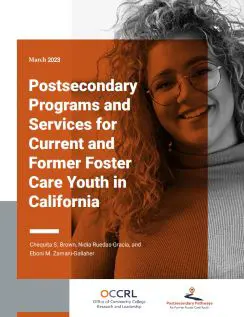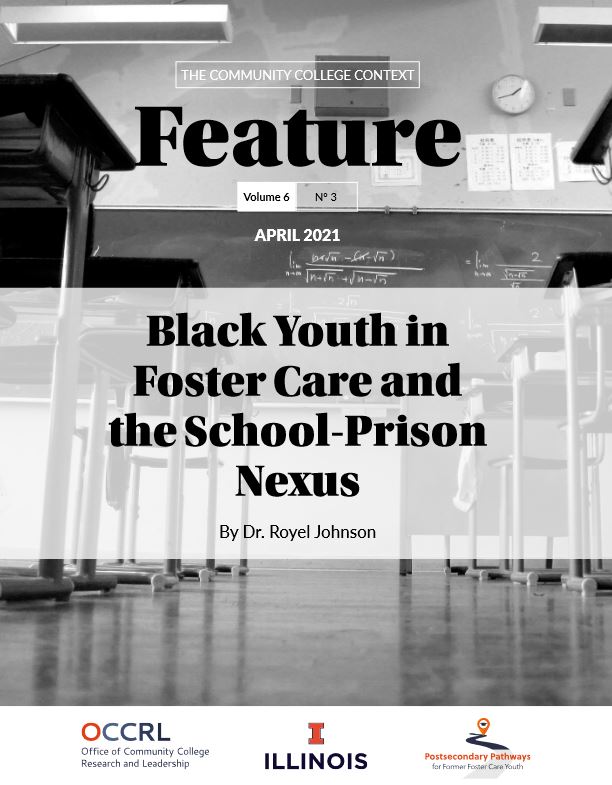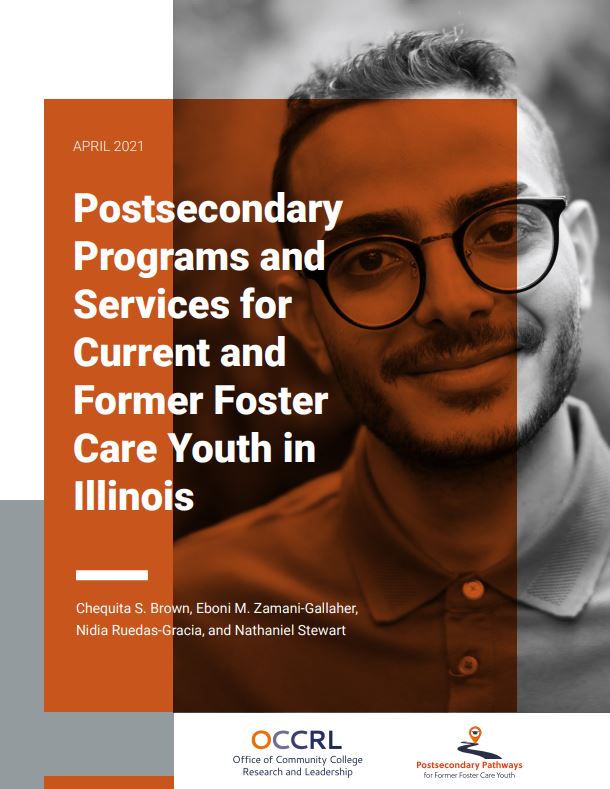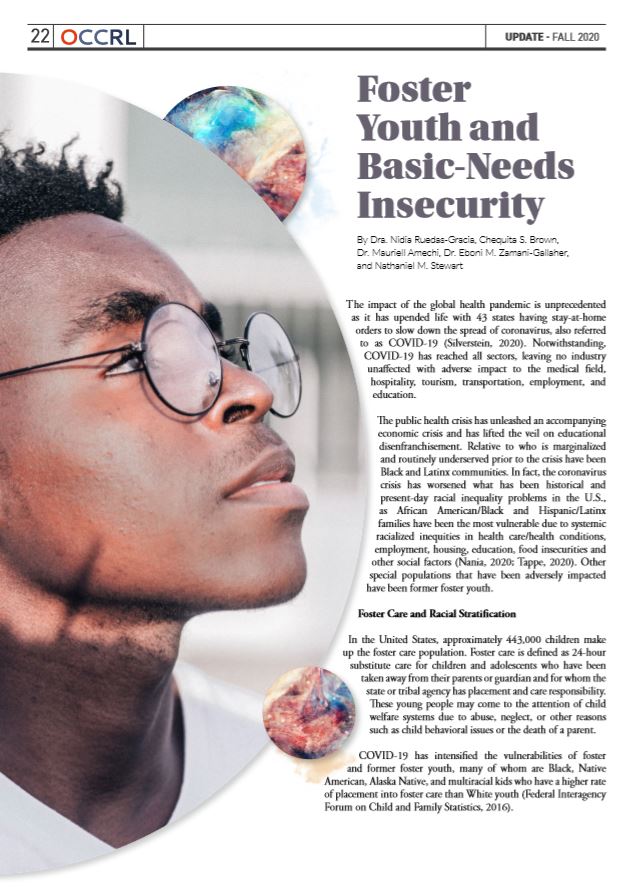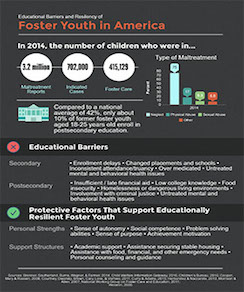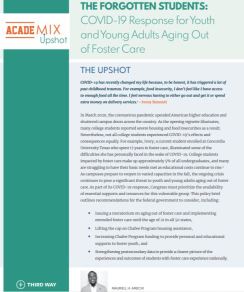
Postsecondary Pathways - for Former Foster Care Youth
This project has been completed and is no longer active.
However, we hope you are able to utilize its resources.
The Postsecondary Pathways for Former Foster Care Youth (PP-FFCY) reflects OCCRL’s commitment to examining and developing postsecondary pathways that support mobility for first-generation, underserved, and minoritized populations, as well as strengthening career pathways to promote seamless transitions from college to careers. This project endeavors to examine postsecondary access, opportunities, and supports for foster youth in Illinois and other states across the county in addressing access and outcomes of FFCY in Career Technical Education (CTE).
Purpose
The Postsecondary Education Pathways for Former Foster Care Youth (PP-FFCY) project is an exploratory study focused on postsecondary pathways for current and former foster youth in Illinois. OCCRL is conducting a comprehensive-needs assessment that provides a descriptive profile of current and former foster youth populations in Illinois; examines postsecondary access, opportunities, and supports for foster youth in Illinois; and addresses disparities in career and technical education (CTE) programs. This project reflects OCCRL’s commitment to examining and developing postsecondary pathways that support mobility for first-generation, underserved, and minoritized populations as well as strengthening and supporting career pathways to promote seamless transitions from college to careers.
Resources
OCCRL aims to increase postsecondary awareness, access, and attainment for current and former foster care youth by providing information on programs and other resources that offer holistic support and services. View the list of postsecondary programs and services.
Strategies to Cultivate a Foster-Friendly Culture on Community College Campuses
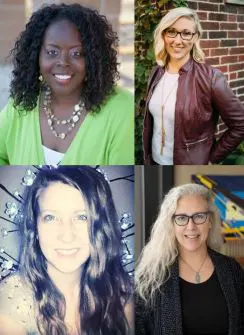 In this episode, Chequita Brown talks with Kate Danielson of the organization Foster Progress, as well as with Anna Wandtke and Tricia Wagner of Rock Valley College in Rockford, Illinois. The group discusses how to cultivate a foster-friendly culture at Illinois community colleges.
In this episode, Chequita Brown talks with Kate Danielson of the organization Foster Progress, as well as with Anna Wandtke and Tricia Wagner of Rock Valley College in Rockford, Illinois. The group discusses how to cultivate a foster-friendly culture at Illinois community colleges.
Navigating College as a Foster Care Alum
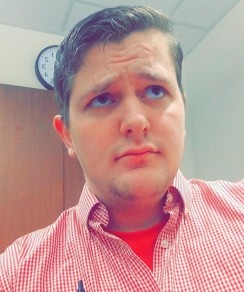 In this episode, OCCRL research assistant Chequita S. Brown talks with Jonathan Stacy, a sophomore at Heartland Community College who is pursuing his studies and a possible career in criminal justice.
In this episode, OCCRL research assistant Chequita S. Brown talks with Jonathan Stacy, a sophomore at Heartland Community College who is pursuing his studies and a possible career in criminal justice.
Listen to the podcast and view the transcript.
Key Elements to Successfully Connecting Foster Care Youth to Educational Resources for Postsecondary Success
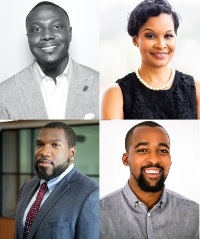 In this episode, Nathaniel Stewart talks with Mauriell Amechi, Regina Gavin Williams, and Blayne Stone Jr. about how the transitions and pathways to postsecondary education are similar and different for Black former foster care students. The scholars also discuss key elements to successfully connect foster care youth to educational resources that help advance the postsecondary education opportunities for this student population.
In this episode, Nathaniel Stewart talks with Mauriell Amechi, Regina Gavin Williams, and Blayne Stone Jr. about how the transitions and pathways to postsecondary education are similar and different for Black former foster care students. The scholars also discuss key elements to successfully connect foster care youth to educational resources that help advance the postsecondary education opportunities for this student population.
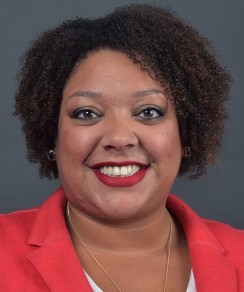
Maddy Day
The Impact of Campus-Based Support Programming on Foster Care Collegians' Postsecondary Access and Retention
In this episode, Chequita Brown of OCCRL talks with Maddy Day about the Fostering Success initiative in Michigan and the impact of campus-based support programming on foster carecollegians' postsecondary access and retention.
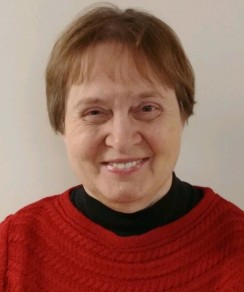
Patricia Palmer
How Youth-in-Care in Illinois Can Access Educational Resources to Pursue a Postsecondary Education
In this episode, OCCRL research assistant Chequita Brown continues the conversation on foster care youth by talking about with Patricia Palmer about accessing available resources in Illinois for youth-in-care who want to pursue a postsecondary education.
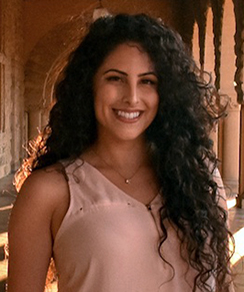
Nidia Ruedas-Gracia
Conceptualizing 'Sense of Belonging' Among Students From Historically Minoritized Racial Groups Within Higher Education
In this episode, Colvin Georges Jr., a research associate at OCCRL, talks with Dr. Nidia Ruedas-Gracia about what it means to have a sense of belonging and discusses her research in this area. They also discuss how a sense of belonging affects college students from historically minoritized racial groups.
Postsecondary Programs and Services for Current and Former Foster Care Youth in California
By Chequita S. Brown, Nidia Ruedas-Gracia, and Eboni M. Zamani-Gallaher
This brief highlights postsecondary programs and services in California that support youth in care, in addition to young adults who are aging out of foster care. Read more.
Tracking College-to-Career Pathways for Foster Youth
By Chequita S. Brown
In this OCCRL Thought Paper, Chequita S. Brown relates how tracking the data of students with foster care experience helps to recognize them as a legitimate student population. She offers recommendations on how to do this and conveys the many obstacles that can hinder the academic and career success of foster youth. Read more.
Black Youth in Foster and the School-Prison Nexus
By Royel Johnson
In this OCCRL Feature Brief, Dr. Royel Johnson argues that the foster care system, and more specifically congregate care facilities, are part and parcel to the enhancement of carceral state power. Read more.
Postsecondary Programs and Services for Current and Former Foster Care Youth in Illinois
By Chequita S. Brown, Eboni Zamani-Gallaher, Nidia Ruedas-Gracia, and Nathaniel M. Stewart
This research brief provides an overview of programs and services that helps strengthen postsecondary pathways for current and former foster youth in Illinois. Read more.
Foster Youth and Basic-Needs Insecurity
By Dra. Nidia Ruedas-Gracia, Chequita S. Brown, Dr. Mauriell Amechi, Dr. Eboni Zamani-Gallaher, and Nathaniel M. Stewart
This article discusses how COVID-19 has intensified the vulnerabilities of foster youth and former foster youth, many of whom are Black, Native American, Alaska Native, and multiracial children who have a higher rate of placement into foster care than White youth (Federal Interagency Forum on Child and Family Statistics, 2016). Read more.
(From the Fall 2020 UPDATE on Research and Leadership)
Exploring Equity in Postsecondary Education
By Heather L. Fox, Eboni M. Zamani-Gallaher
This chapter examines how postsecondary practitioners are encouraged to work collaboratively with child welfare agencies and other community-based organizations to identify and implement culturally responsive supports for former foster youth to promote early academic achievement. Read more.
The Forgotten Students: COVID-19 Response for Youth and Young Adults Aging Out of Foster Care
By Mauriell H. Amechi
This policy brief outlines recommendations for Congress to consider regarding the country's COVID-19 response, in an effort to prioritize the availability of essential supports and resources for youth and young adults who are aging out of foster care. Read more.
Advancing Equity-conscious CTE Program Review via Cross-Campus Collaborations, Dialogue
This past spring, in partnership with the Illinois Community College Board (ICCB), OCCRL facilitated technical assistance to support campuses with preparing to submit program review reports for selected career and technical education programs of study. As defined by the goals of the ICCB Program Review Manual (2022-2026), the sessions offered an opportunity to “support the submission of quality, relevant, contextualized and culturally responsive reviews.”
Further, in alignment with the objectives of the ICCB Program Review Manual, the sessions provided an opportunity to develop submissions focused on reducing inequities, strengthen programming, and contribute to the economic development of the state (ICCB Program Review Manual FY 2022-2026, pg.2).
By way of supporting campuses in promoting continuous improvement that prioritizes program need, cost effectiveness, quality, performance, and equity, OCCRL engaged campus program review teams in dialogue and action-oriented activities to promote success for students and communities. An additional goal was to foster institutional practices that align with current and projected future industry needs.
In a two-workshop series for each campus, OCCRL supported teams at the following institutions selected by ICCB: Black Hawk College, City Colleges of Chicago, Moraine Valley College, Rend Lake College and Lincoln Land Community College. These schools were selected through an application process, and all had identified specific programs of study for assistance in adopting an equity-minded lens to completing a thorough and thoughtful program review submission.
The community college teams included program directors, deans, program support staff, and faculty. The workshop focused on facilitated conversation geared toward the campuses making progress in their program review submissions. Additionally, the OCCRL team provided points to consider as the groups worked to analyze data and identify areas for future research and discovery in their programs.
During the sessions, conversations emerged about how the campuses could respond and deliberately incorporate ICCB’s definitions of success with campus- and program-specific benchmarks to ensure efficient and sustainable programming, as well as ensure academic and student success.
Imperative to working with these colleges, OCCRL reviewed the programs of study and campus cultures to understand the context of all the programs, their origins, the fields of study, and the local and national industry landscape using the Illinois Postsecondary Profiles System. This system, which Is supported by ICCB, continues to be developed to broaden data accessibility. The usage of the tool allowed us to identify our own knowledge gaps, which developed into questions from an outsider’s perspective for the community college teams to consider and assess, with the goal of providing context for the institutions’ program review submissions.
In preparation for the first workshops, the participants were asked to prepare any of the following items to establish a context about the needs of their community colleges:
- Environmental scan or district demographic data
- Labor market information for their region
- Disaggregated data at the program, departmental, or institutional level
- Advisory council membership listings
- Any applicable or relevant industry-specific accreditation standards
This information contributed to a deepened understanding of each program in a context that enabled OCCRL to understand the disaggregated data and support teams in identifying equity gaps, particularly by race, in each respective program.
The first workshops of the series included discussions with the community colleges’ teams to discuss their needs regarding receiving assistance and goals for the process. These initial events offered a chance to learn more about the programs in order to steer guided conversations in the most useful manner.
Additionally, in our two-hour sessions, a timeline was shared for the process as well as a discussion about the differences between equity and equality as a means of level-setting. The goal of the first workshop was to provide additional context and clarity surrounding the purpose and importance of the program review process. Further, it provided an opportunity for participants to ask questions.
Using the 2017-2021 program review manual and template, the sessions included an evaluation of the mission and vision of career and technical education within Illinois to advance dialogue on the role of community colleges to advance equitable outcomes. The workshops, while varied among the individual campuses, expanded and unpacked the elements of the questions being asked and provided additional reflections for participants to assess what was being asked of them.
Furthermore, the workshops centered on identifying and articulating program successes, as well as quantifying challenges. To establish action-oriented solutions, the participants were asked to highlight benchmark programs that they felt were examples to model similar and comparable successes on their own campuses. The community college teams were asked to engage in and respond in these sessions based on evidence, with the objective of ensuring accountability for implementing changes that lead to improvement.
The second series of workshops recapped the ways in which these programs are currently supporting students to navigate and complete pathways as a means of identifying and increasing educational equity, particularly for currently marginalized members of special populations, as defined by Perkins V. The participants were asked to engage in and provide responses on how the programs are providing career-connected learning opportunities to build students’ essential and technical employability skills. Designed to be idea labs, the workshops provided a space for those responsible for these programs to expound on the level and capacity of the support provided to students to advance through higher levels of education, training, and employment success, with respect to the goals of ICCB and the Illinois career and technical educational system. The questions that emerged from these sessions provided an opportunity for teams to be transparent about their accomplishments, trials, and ideas for development.
Additionally, in identifying action steps, participants were asked to evaluate the progress of their institutions in developing a culture of evidence, which is broadly defined as environments in which “decisions are based on facts, research and analysis…where services are planned and delivered in ways that maximize outcomes and impacts for stakeholders” (Office of Quality Assurance, Carleton University, 2014).
In an effort to analyze areas of success, challenges, and opportunities for growth, the participants were asked the following questions:
- How can their programs better serve the learning and career goals of students?
- How are program and curricular decisions made?
- How can program and curricular decisions continue to develop based on data and systematic observations rather than hunches and suspicions?
- Where do you envision your program going based on what was discussed?
- What action steps are necessary to accomplish your program goals?
- What are the steps, resources, and people needed to accomplish these ambitions?
- What resources do you feel are necessary to complete the program review?
- Who is responsible for fulfilling these needs and roles?
Engagement in opportunities that probe and facilitate equity-conscious dialogue are essential as we engage in the work of building and expanding student success and completion across the state. These efforts enable support from individuals outside of the daily operations of institutions, departments, and daily purviews to provide objective considerations.
Further, workshops such as these allow for reflecting on the expectations of the program review process and manual, as well as support to think about the value of striving toward innovative and continuous improvement. In talking through our programs, we can gain insights about relevant and quality information and the ways in which they can be incorporated.
Moreover, program review is an opportunity to discuss data and narratives that depict the full context of our programs in concise ways. These valuable sessions prioritize the program review process and are a purposeful tool in identifying areas for continuous improvement to address racial, gender, and social-economic gaps.
Technical assistance labs and workshops are an opportunity to engage in truly collaborative methods to ensure the process is documented well and that the results inform campus-planning initiatives, quality improvement efforts, and budget-allocation decisions.
References
Carleton University (2014). Learning Outcomes Assessment Newsletter: What is a Culture of Evidence?
Illinois Community College Board. (2021). Program Review Manual Fiscal Year 2022-2026.
Illinois Postsecondary Profiles (2021). Institutional Profiles.